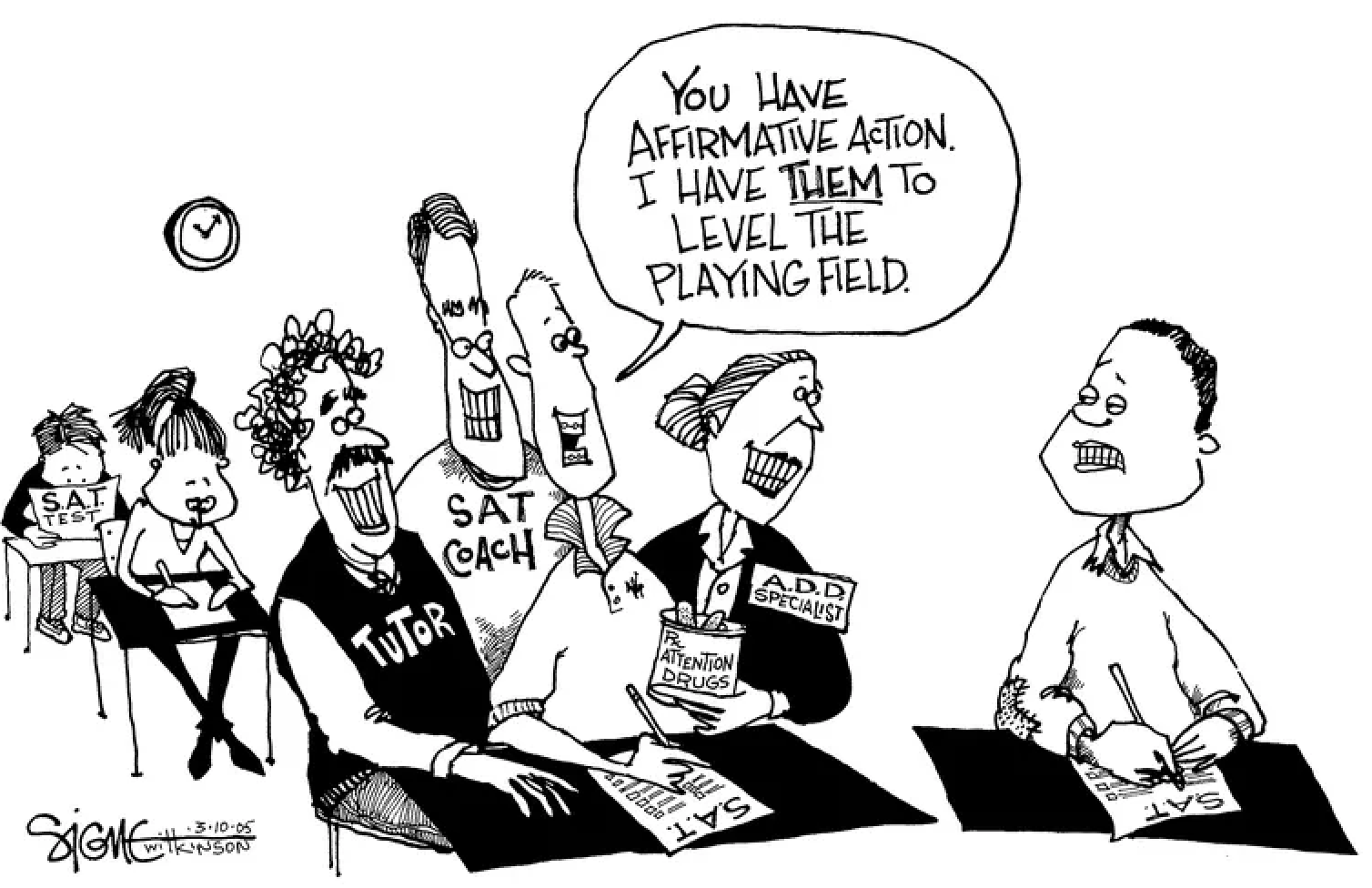College is widely agreed as a gateway
to income stability, general success, and job security. It makes sense that
affirmative action is a highly debated topic. Hell hath no fury like a parent’s
scorn. When looking at college admissions and potential preferential treatment,
all parents, regardless of race, are invested in making sure their children
aren’t discriminated against during the process.
But what about the preference for
legacies in college admissions?
A legacy is someone who is related
to an institution’s alumnus. Therefore, colleges hold preferences for legacies,
citing reasons like upholding core university values and financial security. Being
a legacy means more than just having a leg up during admissions—a legacy’s
chances of acceptance can be two to four times more likely than those of a non-legacy
applicant. Often
labeled as the “white affirmative action” for rich, white, and well-connected
students, reports have stated that minority students only make up 6.7% of the
legacy applicant pools. 6.7 out of 100 percent. Generally, legacies make up 10 to 15 percent of the
annual freshman population at most elite institutions in the United States. At Georgetown
University, legacy applicants made over 30% of the entering class of 2021. Legacy programs are overwhelmingly
white and rooted in white supremacy. Being a legacy essentially requires a
lineage privileged enough to attend college. Black students were not admitted
into elite institutions for the vast majority of American history. Over its
400-year history, Harvard admitted a total of 12 Black applicants until the
1970s. Overt
forms of educational redlining, such as racial quotas or race-based exclusion rooted
in grandfather clauses, are cornerstones in every American elite institution.
In the 1920s, Harvard implemented a Jewish quota after noticing an ‘influx’ of
Jewish admits.
In the 1990s, Senator Dole
questioned the legitimacy of legacy admissions under the 1964 Civil Rights Act
for providing “unfair advantages” to students already born into wealth and
status. In
the early 2000s, Senators Lott and Edwards publicly admonished these programs
for upholding “special privileges” for white students and enforcing the
disproportionate negative impacts towards minority college applicants. With
this pattern of congressional criticism, are legacy programs legal?

Legacy programs are forms of off-brand
nepotism. Nepotism is unconstitutional under the Nobility Clause, which bans
officials from accepting titles from higher powers without congressional
permission. The only historial exception for collegiate legacy preference was strictly for military students during the 1800s. It made sense at the time—military
schools like West Point would hold preferences for applicants whose relatives died
in battle as those students were more likely to understand the heavy
implications of being in the army. Nonetheless, the definition of “war
veterans” eventually (predictably) shifted. Descendants of those in the upper echelons of the
military held more institutional value over those whose nameless fathers died
in battle. After public outrage alleging that institutions like West Point preferred
applicants belonging to the rich and powerful, Congress stepped in to re-narrow
the conditions of the legacy program. Preference would only be given to the descendants
of those who had fallen during service, partly as a means of reparations, and
would only be applied to a limited number of applicants—vastly decreasing the number
of legacy applicants. Presently, West Point no longer gives special considerations to
children of alumni.
This is not to say that legacy
applicants as individuals aren’t deserving of admittance to elite universities.
Most legacy students do comparatively well against their non-legacy
counterparts, and being a legacy doesn’t necessarily guarantee admittance. But
the issue isn’t how well legacy students do in school, it’s how they get there. If legacy
applicants were judged on the same playing field as others, 5 to 10% of legacy
students would not be admitted. Justice Powell, in his opinion for
Bakke (1978), asserted that universities hold the power to make their own
decisions in creating a diverse student body. But being a legacy doesn’t
increase student body diversity or prove an individual’s excellence; it’s just
a reflection of their family tree—one that is most likely rooted in privilege
and wealth. As Dannenberg states, an applicant’s ‘affinity’ for college should
be determined by how many obstacles they have overcome rather than the amount
of advantages in their life.
Legacy preference is meaningless
privilege. Colleges claim that those who have a history with their individual
institutions are more likely to have a “natural affinity” for the college
because they have inherited their parents’ drive and a stronger passion for a
university’s culture. However, drive is not inherited. The assumption that
legacies have more to offer an academic community solely because of their
parent’s alumnus status or because they know the campus football culture better
than other applicants, dismisses the potential contributions of students that come
from different or more disadvantaged backgrounds. As reflected in congressional
precedent and the Nobility Clauses, our nation’s predecessors decried
hereditary privileges as being antithetical to the American principle of
equality and democratic meritocracy. Even if 99% of a hypothetical entering class, whether
in colleges, Congress, or the military, is determined by non-hereditary
influences, upholding 1% of admittances based on generational connections is
still unethical.
Nevertheless, legacy admissions are
technically legal. In a case against the University of North Carolina, the
court judged that legacy programs were key to maintaining revenue to
universities and created a
non-binding precedent. However,
as recent critics have asserted, the legacy program is unconstitutional under
the Equal Protection Clause of the 14th Amendment. Public
universities that uphold legacy admissions violate the obscure provision that
denies “granting any Title of Nobility.” Furthermore, as legacy admissions
discriminate based on ancestry, it violates the 1866 Civil Rights Act. As
Kahlenberg states, the legality of legacy programs is a “myth.” White people have always had access to elite institutions. When colleges
claim preference for those with histories with higher education, they are
blatantly guarding the gilded side-door to continued white privilege.
Just
because it’s legal doesn’t mean it’s right. Legacy programs must be redetermined
under legal strict scrutiny and subsequently abolished.
By: Celeste Woojoo Roh